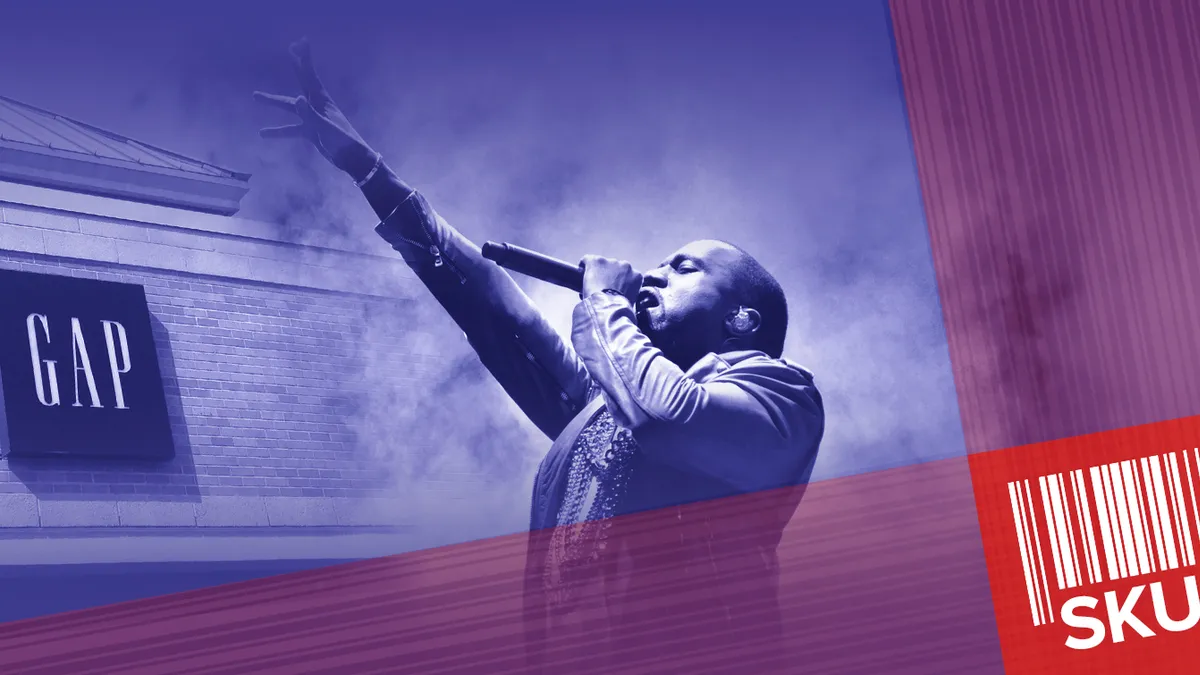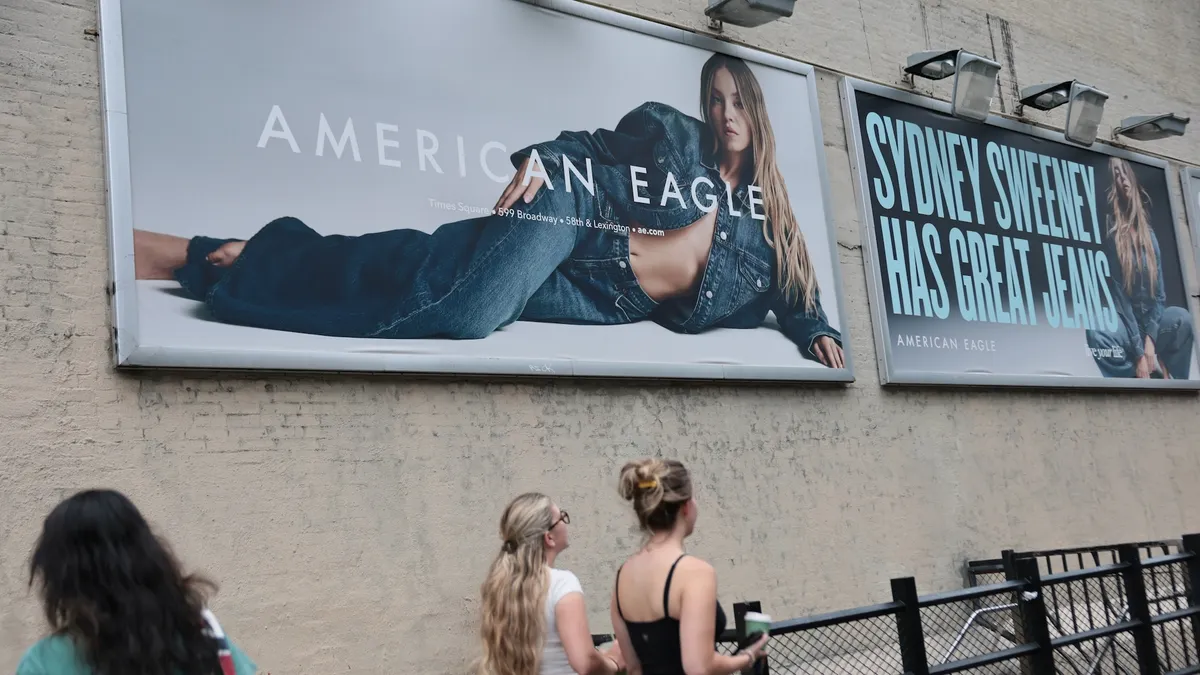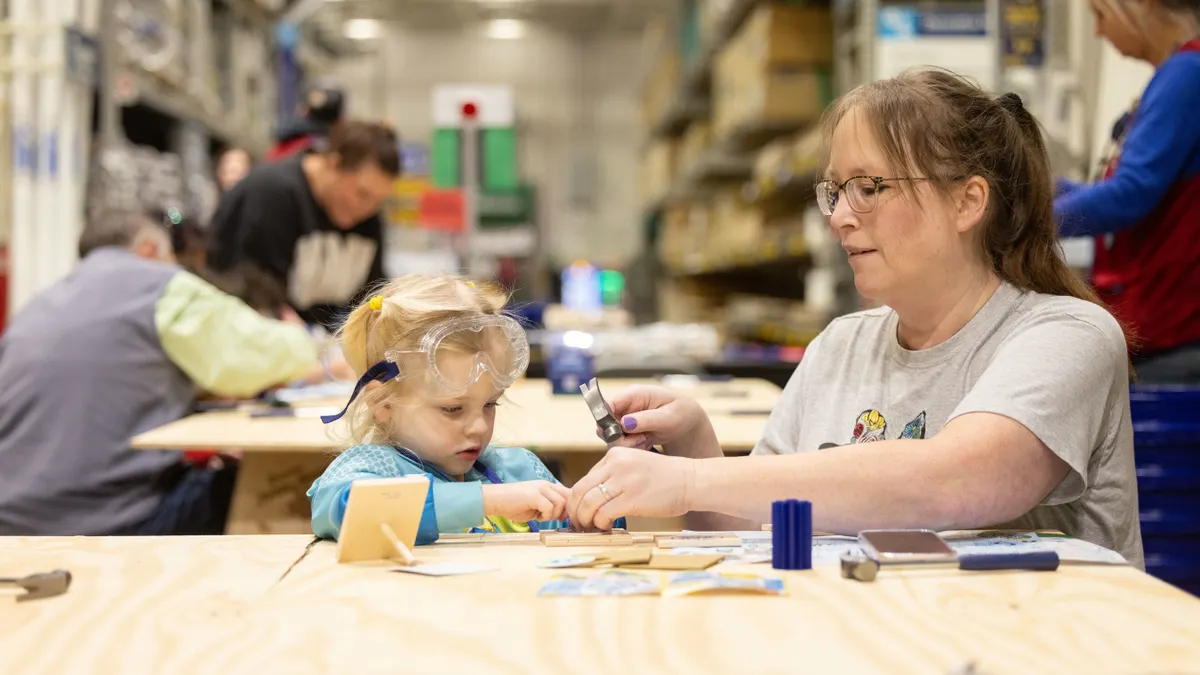Kaarin Vembar is obsessed with the luxury and apparel markets. She also has a sassy mouth so her managing editor decided to give her a column in an attempt to harness insight for readers. Kaarin can be reached at [email protected].
This is the story of two deals.
You are going to want to compare and contrast them, but don't. Instead, pay attention to the larger tale about a company that made a decision about its place in the world.
June 26, 2020: Kanye's Story
Has anyone at Gap actually listened to "The College Dropout?"
That was my first thought on June 26 when I read Gap's amazing press release announcing the company's partnership with Kanye West. In it, the company spelled out its plan for a new Yeezy Gap apparel line that is expected in the company's namesake stores by 2021.
"The partnership brings the relationship between West and Gap full circle, as Kanye worked in a Gap store as a teen growing up in Chicago," the release states, which made me laugh out loud. Because I certainly do recall Kanye's early career and what he had to say about the retailer.
"The College Dropout," West's debut album as a rapper, dropped in February 2004. The track "Spaceship" speaks directly to Kanye's experience while working at Gap, a song Pitchfork at the time called a "working-class lament."
"Let's go back, back to the Gap,
Look at my check, wasn't no scratch.
So if I stole wasn't my fault.
Yeah, I stole, never got caught.
They take me to the back and pat me.
Askin' me about some khakis.
But, let some Black people walk in, I bet they show off their token Blackie.
Oh, now they love Kanye, let's put him all in the front of the store."
These are seminal moments that West had at the age of 15. The "before" part of his life, where he was broke but knew he was talented and resolved to become the powerhouse he believed himself to be. But, his work reality spoke to the quiet desperation of the retail associate experience — some of which has changed very little. In an SEC filing from May 19, Gap reported that the median annual total compensation of its employee base in 2019 was $6,177. The company's combined annual reported compensation of its former CEO and interim CEO for that time period was over $9.6 million.
Years later, in the "after" — as in, after Kanye became a millionaire, and ultimately made his way to billionaire status thanks in large part to his Yeezy brand — he would recall his time at Gap as one that revealed to him a love of apparel. He wrote about his time with the company in a 2015 article for Paper, where he said, "It's funny that I worked at the Gap in high school, because in my past 15 years it seems like that's the place I stood in my creative path — to be the gap, the bridge."
While the news of the collaboration seemed to come out of nowhere, there is a case to be made that Yeezy is an extension of Gap's aesthetic. At its core, the Yeezy apparel brand is built on minimalism. And West has continued to reference Gap throughout his career, as recently as in his Fall 2020 show in Paris, when he spoke with Vogue about scaling apparel while referencing the retailer.
But, just as the raw ambition of College Dropout-era Kanye was once easy to connect with (Pitchfork actually used the word "personable" to describe him), this current Yeezy Kanye is a live wire. Which makes it confusing as to why a mass retailer that is in desperate need of a Hail Mary would pin its hopes on the Yeezy aesthetic and West as a personality.
Kristin Bentz, president of KB Advisory Group summarized the confusion in an earlier interview with Retail Dive when she said, "There's no way in hell that Yeezy customer has shopped [at Gap] in the last 20 years and there's no way in hell they're going to shop there now. At first I thought it was a joke. This to me is lipstick on a pig for Gap after years and years of missteps. I don't think this resonates with that Gap consumer. This is some kind of weirdo last-ditch effort."
The days following Gap's celebratory announcement were full of chaotic Kanye West news.
July 4: Kanye posts on Twitter that he is running for president. Elon Musk and Kim Kardashian West immediately follow with Tweets of support. Musk reportedly later walked back his support.
July 5: News outlets generate articles asking variations of "is he serious?" Reuters reports that West can either a) get the backing of a smaller political party or b) run as an independent candidate, even though deadlines to register have already expired in a number of states.
July 6: The Small Business Administration releases details of the companies that received loans under the Paycheck Protection Program. Yeezy received a loan of between $2 million and $5 million through the program. The same day, WWD reports that West filed a fashion trademark application for "West Day Ever" for a number of apparel items including polo shirts, dress shirts, hoodies and tracksuits.
July 8: In an interview with Forbes, West states that he is running under a new banner named the "Birthday Party," reveals that he has never voted, renounces his former support of President Donald Trump, says he was sick with COVID-19 back in February, and wants a White House organizational model based on Wakanda. (Let's be honest, that last part actually sounds great.)
It's been two weeks.
Honestly, I reread all of that news and took a 15-minute power nap because I was overwhelmed. And, sidenote, how much would you pay to witness Gap's C-suite in the days after West announced he wanted to become president of these United States? What a glorious garbage fire.
June 26, 2020: Telfar Clemens' story
The day that the Gap announced its partnership with Kanye, Telfar Clemens hadn't been paid.
In January, Gap said that it had a collaboration agreement with Telfar, a fashion-forward, affordable (especially by luxury standards) brand by designer Telfar Clemens who is known for unisex clothing designs. The designer took the fashion world by storm with the Telfar Shopping Bag, nicknamed the "Bushwick Birkin" which has been especially championed by people of color and those in the queer community.
Telfar is prolific and represents a new era of fashion, one that is inclusive, joyful and thoughtful. With the company tagline "It's not for you — it's for everyone," the potential collaboration showed promise that Gap was forward-thinking about its audience and its priorities regarding inclusivity.
But, mid-pandemic, the deal fell apart. A spokesperson from Gap Inc. told Retail Dive, "While we've chosen not to move forward with the Gap x Telfar partnership at this time, we're making whole on our payment regardless and have only respect and appreciation for Telfar's time and vision." Gap also told multiple news outlets that the deals between Yeezy and Gap, and Telfar and Gap, were handled by different teams.
Clemens went on to tell the The New York Times that he was happy for West and Mowalola Ogunlesi, the design director for the project, and didn't like the social media narrative that pitted him against West. "I am really glad to be free of it," he said.
"We grew up looking at the edifice of the mall and wanting to be part of it, to have power there. Now we have realized we shouldn't. It has been part of our survival to become content for a bigger brand so they can make a statement about their racial solidarity. But the real problem is the initial situation that blocks a designer's progress so they need to say 'yes' to such a thing," Creative Director Babak Radboy told the Times.
June 26, 2020: The Aftermath
Chances are by the time this goes to print it will already be outdated because the news cycle surrounding Mr. West moves at such a ferocious clip that it's hard to keep up.
But, that's kind of the point.
Telfar's warning about not pitting the two artists against one another holds weight. But, Gap did stand at a crossroads and made a conscious decision about its brand. It hitched its destiny to a mercurial personality. It bet its survival on a superstar that, for better or worse, refuses to be boxed in.
What I really wish it would have done was continue to invest in design versus the flash of personality. I wish it would invest more in its associates so they can make more than $6,000 a year working part-time. I wish it would invest in how people dress in 2020 versus continually pumping out clothes that worked in the 90s.
Kanye's song "Spaceship" says:
"In the mall 'til twelve when my schedule had said nine.
Puttin 'em pants on shelves.
Waitin' patiently I ask myself,
Where I wanna go, where I wanna be?"
My frustration with the apparel retailer isn't born of disdain for the brand. It's due to exhaustion that they continue to miss the mark and the point. To which I ask Gap: Where do you want to go? Where do you want to be?
























